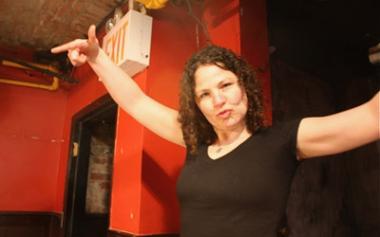A lot of us conceive of Western Massachusetts in terms of the cozy, college-crammed, latte-happy Valley. But the Real World is nearer than we like to think, and it’s alive and well in the neighboring hilltowns. Or maybe not all that well, judging from Lucy Thurber’s play Scarcity.
Thurber lives and writes in New York, but she hasn’t forgotten her upbringing in Russell, one of those isolated hamlets flanking the exitless stretch of the Mass Pike between Westfield and Lee. Scarcity takes place in an unnamed “small Western Massachusetts town,” but the locale is unmistakable: the local pizzeria is the Russell Inn.
The play, which opens this weekend at UMass, takes the lid off a working-class family to explore its multiple dysfunctions and competing desires. Martha works 50 hours a week and even with food stamps can’t make ends meet, while her loutish husband Herb is content to drink away his unemployment checks.
Teenage Billy and his kid sister Rachel are preternaturally bright kids who deal with the household stresses by, respectively, getting into fights and peering into Tarot cards for a better future. Martha’s cousin Louie, the town cop, is in love with her, but she’s still crazy about Herb despite his brutish behavior, drawn to him like Stella to Stanley.
Into this stew of co-dependency and messy lives comes Ellen Roberts, a new teacher at Billy’s high school who has taken an interest in him. She comes from Boston and wealth, but is here in the boonies because she’s interested in “education in rural America” and wants to “make a difference.” And she does, by pulling strings to get Billy into Deerfield Academy, despite his parents’ not unwarranted view of her as a condescending do-gooder whose interest in Billy goes beyond his academic potential.
A review of the original New York production in 2007 placed Thurber in the new generation of women playwrights “who grew up watching shows like Roseanne but were able to peel away the laughs and reveal the ugly lives beneath.” Kara-Lynn Vaeni, a visiting professor in the UMass Theater Department and director of this production, says she was warned “how depressing this play is,” but she doesn’t necessary agree.
“In life you try to find the humor and try to find the hope, and so that’s where I’m coming from. I didn’t want the actors to be playing for the sad. There is humor in it, and then two seconds later the playwright punches you in the face and you feel guilty for laughing.”
She has high praise for her student cast, two of whom play older than their age (early 40s) and one of them younger (11)—and who, she confesses, were less self-conscious that she about rehearsing the play’s two sex scenes, one of them offstage but loud, the other performed barely a yard away from the front row of the intimate Curtain Theater.
Dramaturg Emily Denison says this slice of hilltown life was chosen for production because “We thought it would be a great opportunity to do a play that speaks to our audience, to students who grew up in Western Mass.” One can only hope that for them, it doesn’t strike too close to home.
Scarcity: March 31-April 9 (talkback with the playwright after the April 8 performance), Curtain Theater, Fine Arts Center, UMass-Amherst, (413) 545-2511, (800) 999-UMAS or www.umass.edu/theater.



